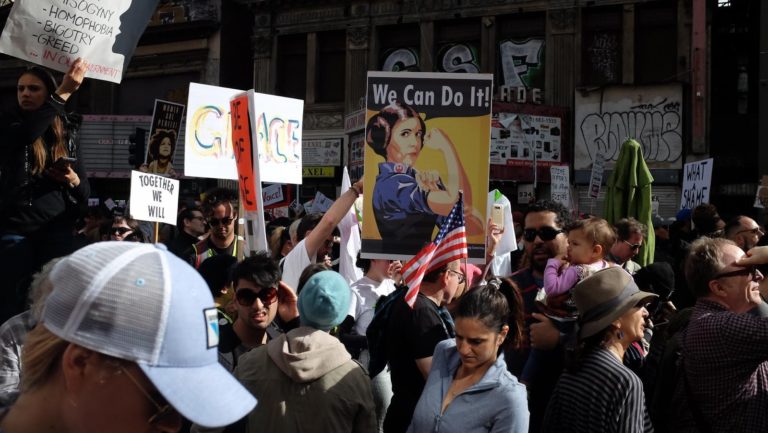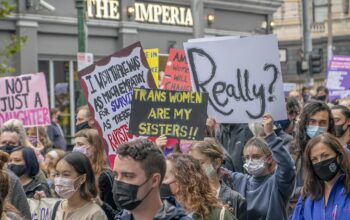Feminism needs to include women of colour, Muslim women, women from all religions and no religions, disabled women, sex workers, trans women, gay women, queer women, fat women, skinny women. It needs to cater to all women. The fact that the term ‘intersectional feminism’ (acknowledging the fact that all women have different experiences and identities) exists proves that the general movement is often exclusive and largely white.
Mainstream, western feminism isn’t always intersectional. There are feminists who often don’t realise or can’t relate to the fact that for women of colour, of different faiths, abilities, it’s not just gender that they’re discriminated on.
Such women are affected by these circumstances professionally, socially and mentally, and yet don’t always receive the help and support that’s needed. Issues are all too often seen through white lenses and how they affect white women, such as the pay gap that’s based on gender, sexual harassment and everyday sexism. We don’t see many platforms which seek out Muslim women’s experiences of these topics. Think of the countless articles, research pieces, features that looked at sexual assault, how many of those included Muslim women’s stories? Given the wide scope of women affected by sexual misconduct, there were definitely Muslim women who were affected, so why have we not heard any of their voices?
There have been many discussions about the age we should enforce sex education, for example, but do we ever see Muslim women being given a platform to discuss when they think it’s a good idea? The problem is that a large slice of western, 21st century feminism seems to be white feminism (meaning feminists who prioritise main issues that influence white women and preclude the ones that affect women of colour). And that’s because white voices are amplified the most when it comes to women’s issues or even represented by a white face. There are of course the intersectional ones, the comrades, the ones who get it, but they’re rare and few.

Feminism often feels like it only accepts those who look like they subscribe to its ideals. Someone in a burka or a niqab isn’t seen as having influence therefore is pitied or only accepted if their fight is against the religious imposition. A Muslim woman who not only wears a headscarf, but a burka, a niqab, and/or who has conservative views about sex and sexuality, is not usually accepted into feminist groups as easily because the idea is that Islam is inherently oppressive and the only way to be liberated is to become more liberal.
But Muslim women shouldn’t need to conform to western ideals and show that they’re Muslim but they’re not that religious, that they date against their parents’ will, that they’re sexually liberated, to be accepted.
Differences but…?
Muslim women shouldn’t need to water down religion and culture to be accepted. Why should we as feminists only unite because of common denominators? Yes, Muslims don’t believe in sex before marriage, they believe in modesty (for both men and women), they live in patriarchal communities, which is considered a very normal thing because who practically doesn’t. These things might not scream freedom to a lot of people, but it works for Muslims, while some of it doesn’t.

Muslims are not a monolith and you’ll come across every type under the sun. The point is, people should be equally receptive of a person, no matter what their beliefs. The western feminist movement should be able to deal with the idea that some women believe in things that might otherwise contradict their idea of feminist thought, like the headscarf, niqab and so on.
If we’re supposed to be all about choice and letting women do what they want with their bodies, why do we have a problem when they want to cover it up? Sure, not all women are afforded the luxury of choice, and we should support them too. But some choose to cover up, to obey God. Many women are empowered by hijab, by religion, and these women need to have their narrative accepted.
In conclusion
Submission is a big part of Islam. Muslims do things, sometimes without question to please Allah (God). And somehow the perspective of submission isn’t seen as a free concept and may even seem like an antithesis to freedom itself. But we’ve got to respect that people are exercising their free will when they choose who to submit to. Some of us are perfectly happy to subscribe to such ideals, and that deserves some respect.
One woman might want to become a homemaker, another might want to be a sex worker. One girl might grow up, waiting her whole life wanting to get married. And maybe one of them wants to serve God and be a nun. Let’s accept them all. The point is, let’s support and stand for all kinds of women, even the ones who choose to do things you don’t agree with, as long as they’re not hurting themselves or anyone .
by Ola Kaddoura
Photo Credits
Noor Fadel, Sally T. Buck , CC BY 2.0
Women’s march in Seattle, Suz , CC BY-NC-ND 2.






